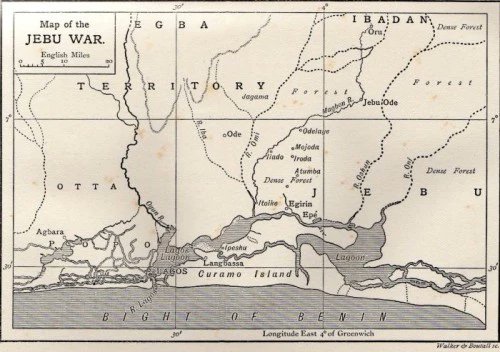The Battle Of Magbon
In 1892 the British authorities were encountering problems in their dealings with the Ijebu kingdom. The Ijebus, proud, isolated and determined, lived between 50 and 60 miles north-east of Lagos on the Magbon River, and Ijebu Ode was their capital.
Ijebuland straddled important trade routes from the interior and the Ijebus received an income by charging customs dues. The Ijebus, a Yoruba-speaking people, did not want foreigners to cross their territory.
In 1890 the Egirin market a few miles west of Epe on Lagos Lagoon had been closed by the Awujale, ruler of the Ijebu, cutting off the Lagos people from a source of up-country goods and commodities. Lagos had been a Crown Colony since 1886 and although envoys from the British Governor in Lagos persuaded the ruler to re-open the market, a mood of hostility towards the British prevailed amongst the Ijebu

London then instructed Lagos to obtain an apology from the Awujale for the perceived “insult” to Denton, and to insist on free right of way through the Awujale’s territory. In January 1892 a representative of the Awujale went to Lagos to agree to the British demands, and in return the British granted the Ijebu 500 pounds annually to compensate for the loss of customs revenue. However the tribe was unhappy with this outcome as it did not wish to change its traditional methods and practices, particularly when threatened by foreigners.
A white missionary was allowed through Jebu territory but the second one who tried received a rough time and was sent back, as was a party of Ibadan porters attempting to come south through Jebu Ode. London now authorized the use of force, quickly sending out some special service officers from England to act as a military staff. One of these was Captain Edward Roderick (“Roddy”) Owen of the Lancashire Fusiliers, a famous jockey at British race meetings.
Troops from along the West African coast were concentrated at Lagos. The Gold Coast Constabulary sent 150 men from Accra, the 1st Battalion The West India Regiment (the British garrison regiment for West Africa) sent a company from Sierra Leone. These troops joined 150 “Lagos Hausas” (mainly escaped slaves from the north of Nigeria that had been recruited and trained into an efficient unit now titled the Lagos Constabulary) and some irregulars from Ibadan, north of Jebu country.
The Inspector-General of The Gold Coast Constabulary, Colonel F.C. Scott C.B., was the force commander and on 12th May 1892 he moved his armed men and 340 carriers by a flotilla of vessels and canoes up Lagos Lagoon, and landed at Epe without opposition. Scott’s men had 7-pounder field guns, Nordenfeldt guns (hand-cranked multi-barrel weapons that fired in waves of rounds), rocket troughs and Maxim machine guns as fire support. At Leckie, near Epe, another 186 carriers joined the force.

The Jebus were believed to have some old Snider rifles, but the tribe was not rated highly as fighters. This assumption was mistaken. The British left Epe on 16th May and marched to Pobo where it burned four villages but took 8 casualties. The next day the force reached Atumba and had to fight hard for half an hour. One Briton was killed and one wounded whilst 12 Africans were wounded. The Jebus lost heavily to machine-gun fire.
The advance continued with the Ibadan irregulars scouting ahead and the Gold Coasters and Lagos Hausa alternating daily as Advance and Rear guard. All Jebu villages found were torched. Colonel Scott was anxious to prove that the Gold Coasters and Hausas could fight as effectively as the regular West Indians, and so the latter were kept tucked away in the Main Column. The track to Jebu Ode that the British were following was the main trade route, and the outer edges where feet had tramped for hundreds of years were well rutted down, leaving a triangle of earth in the middle which had to be straddled by the marchers. Thick bush on either side forced the British column into a single file two miles long, allowing the Ijebu to easily pick off soldiers and then disappear, leaving a corpse or wounded man blocking the track.
However, the Ijebus losing a thousand warriors and seven chiefs and were anxious to stop the burning of any more villages. They accepted defeat.
A few hours later Ijebu Ode had a Union Flag flying over it, the Awujale’s palace was being used as the British officers’ mess and the surrounding buildings housed the soldiers. Flying columns marched along the trade routes declaring them open, Roddy Owen commanding the one that went north to Oru to destroy the Ijebu toll gates there.
Scott returned to the Gold Coast as Sir Francis Scott, Knight Commander of St. Michael and St. George (K.C.M.G.). Major Madden became a Companion of the Distinguished Service Order (D.S.O.) and Captains Owen and the Honourable Arthur Stewart Hardinge, Royal Scots Fusiliers, were given Brevet promotions to Major (London Gazette No: 26330 dated 30 September 1892).
The British troops were awarded The East & West Africa Medal with Clasp dated ‘1892’. Today, one of these medals can be found in Fitzwilliam Museum in Cambridge.
Ijebu kingdom was later annexed to the colony of southern Nigeria. But, the battle for freedom, continued......
-

Yorubas Contribution to Civilization (They also Gave world the alphabet)
Added 3,266 Views / 0 Likes


